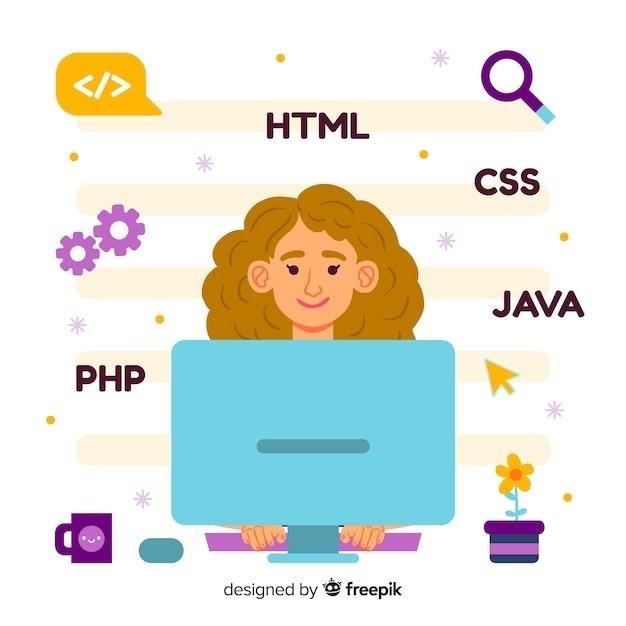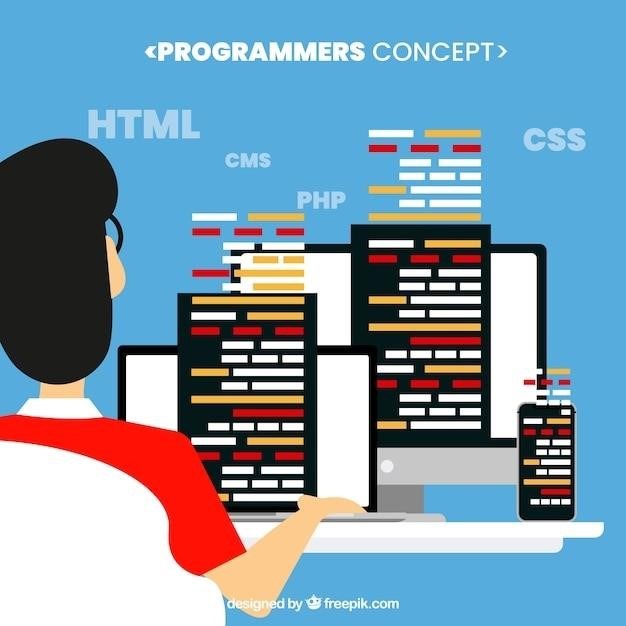Downloading and Accessing the PDF
Numerous online resources offer “Programming⁚ Principles and Practice Using C++” as a PDF download. Utilize search engines‚ leveraging keywords like “Bjarne Stroustrup C++ PDF” to locate reliable sources. Direct download links may be available from reputable ebook platforms or educational websites. Be cautious of unofficial sites; verify the source before downloading to ensure the integrity and safety of the file. Always check for reviews and ratings before proceeding with the download to ensure a quality and reliable product. Many sites offer the book in various formats such as PDF‚ EPUB‚ and MOBI.
Locating Online Resources
Finding reliable online resources for the “Programming⁚ Principles and Practice Using C++” PDF requires a strategic approach. Begin by using major search engines like Google‚ Bing‚ or DuckDuckGo. Employ precise keywords such as “Bjarne Stroustrup C++ PDF download‚” “Programming Principles and Practice Using C++ free PDF‚” or even the ISBN number (if known). Explore educational websites and online libraries; many universities and colleges may host the book or provide links to legitimate download sources. Remember to scrutinize search results carefully. Prioritize official-looking websites associated with the publisher‚ Addison-Wesley‚ or the author‚ Bjarne Stroustrup himself. Be wary of unofficial sites or those offering the book for free from questionable sources‚ as these may contain malware or be of inferior quality. Check the file size and metadata before downloading to ascertain its authenticity and avoid potentially harmful files. Look for user reviews and ratings before downloading to ensure a quality and reliable source.
Utilizing PDF Download Links
Once you’ve identified a trustworthy link for downloading the “Programming⁚ Principles and Practice Using C++” PDF‚ proceed cautiously. Before clicking any download button‚ carefully examine the URL for suspicious elements. Avoid links that appear overly simplistic or lack a professional design. Legitimate download sources usually have clear terms of service and privacy policies. Before initiating the download‚ ensure your antivirus and anti-malware software are up-to-date and active. This crucial step protects your computer from potential threats hidden within compromised files. After the download completes‚ scan the PDF file again using your security software to ensure its safety. Pay close attention to the file size; an unusually small or large file size compared to what’s expected might indicate a corrupted or malicious file. If the download originates from a torrent site‚ be sure to check the comments and ratings to gauge its trustworthiness. If you encounter any problems during the download‚ double-check your internet connection and try again later. Remember‚ caution and verification are key to a safe and successful download.
Accessing the eBook Versions
Beyond PDF downloads‚ “Programming⁚ Principles and Practice Using C++” might be available as an eBook through various online platforms. Reputable eBook retailers like Amazon Kindle‚ Google Play Books‚ or Apple Books often carry this title. Searching these platforms directly for the book’s title and author (Bjarne Stroustrup) is the most reliable approach. Check user reviews before purchasing to gauge the quality of the eBook version. Many eBook readers offer features such as adjustable font sizes‚ highlighting‚ and note-taking capabilities‚ enhancing the reading experience. When purchasing from online retailers‚ ensure you’re using a secure connection (HTTPS) to protect your payment information. After purchasing‚ download the eBook to your preferred device (e-reader‚ tablet‚ or computer) according to the platform’s instructions. Be aware that different eBook formats might have varying compatibility with specific devices. Consider the device you intend to use for reading before making your purchase. Some eBook platforms might offer free sample chapters‚ allowing you to preview the content and formatting before committing to a full purchase. Explore this option to ensure the eBook meets your needs and preferences.

Content Overview of the Book
This comprehensive textbook covers fundamental programming concepts‚ delves into object-oriented programming using C++‚ and introduces the Standard Template Library (STL). It provides a structured approach to learning C++‚ suitable for both beginners and those with prior programming experience.
Fundamental Programming Concepts
The “Programming⁚ Principles and Practice Using C++” PDF likely begins by establishing a solid foundation in core programming principles. This section would introduce fundamental concepts such as variables‚ data types (integers‚ floating-point numbers‚ characters‚ booleans)‚ and operators (arithmetic‚ relational‚ logical). Expect clear explanations of expressions‚ statements‚ and control flow mechanisms like conditional statements (if-else) and loops (for‚ while). The importance of proper code style and readability would also be emphasized‚ along with techniques for debugging and testing simple programs. The book might use illustrative examples to demonstrate basic input/output operations and how to interact with the console. Early chapters often focus on building small‚ self-contained programs to reinforce the understanding of these fundamental building blocks. This foundational knowledge serves as a springboard for more advanced topics in later chapters‚ ensuring a strong grasp of the underlying principles before tackling more complex programming paradigms and techniques. A strong emphasis is placed on the importance of writing efficient and readable code.
Object-Oriented Programming in C++
A significant portion of “Programming⁚ Principles and Practice Using C++” is dedicated to object-oriented programming (OOP) concepts. This section would delve into the core principles of OOP‚ including classes and objects‚ explaining how to define classes with member variables (data) and member functions (methods). The crucial concepts of encapsulation (bundling data and methods)‚ inheritance (creating new classes based on existing ones)‚ and polymorphism (allowing objects of different classes to be treated generically) would be thoroughly explored. The book would likely illustrate these concepts with practical examples‚ showing how to design and implement classes to model real-world entities. The use of constructors and destructors for object initialization and cleanup would be explained‚ along with the importance of proper object lifetime management. The difference between composition (using objects as members of other classes) and inheritance as design strategies might be discussed. Abstraction‚ another key OOP principle‚ would be addressed‚ showing how to hide implementation details and expose only essential functionality to users of a class. The text likely emphasizes the benefits of using OOP techniques to create modular‚ reusable‚ and maintainable code.
The Standard Template Library (STL)‚ a crucial component of the C++ standard library‚ is likely introduced and explained in detail within “Programming⁚ Principles and Practice Using C++”. This section would cover the fundamental components of the STL‚ including containers‚ iterators‚ and algorithms. The various container types offered by the STL‚ such as vectors‚ lists‚ maps‚ and sets‚ would be described‚ highlighting their respective strengths and weaknesses and when each would be the most appropriate choice for a particular task. The concept of iterators‚ which provide a generic way to access elements within containers‚ would be explained‚ showing how they enable writing algorithm code that works with various container types without modification. A substantial portion would be dedicated to explaining the standard algorithms provided by the STL‚ such as sorting‚ searching‚ and transforming elements within containers. The book would likely provide examples demonstrating how to use these algorithms efficiently and effectively. The importance of using the STL to promote code reusability and reduce development time would be stressed. The potential performance implications of choosing different container types and algorithms might also be discussed‚ guiding readers in making informed decisions based on their specific application needs. Understanding the STL is presented as essential for writing efficient and robust C++ code.

Practical Application and Exercises
The book likely features numerous code examples to solidify concepts. Hands-on exercises test comprehension‚ progressing from basic to advanced challenges. Advanced project ideas encourage creative problem-solving and practical application of learned skills. Solutions or hints might be provided to guide the learning process.
Working with Code Examples
Effectively utilizing the code examples within “Programming⁚ Principles and Practice Using C++” is crucial for a comprehensive understanding of the concepts discussed. These examples serve as practical demonstrations of the theoretical principles explained in the text. Begin by carefully reading the accompanying explanations before attempting to compile and run the code. Pay close attention to the comments within the code‚ as these often highlight key concepts or potential pitfalls. Experiment with modifying the code to observe how changes affect the output. This hands-on approach allows for a deeper understanding of the underlying mechanisms. Consider using an Integrated Development Environment (IDE) such as Code⁚⁚Blocks‚ Visual Studio‚ or Xcode‚ as these provide debugging tools to help identify and resolve errors more easily. For each example‚ make sure you fully understand the purpose and functionality of each line of code. Don’t hesitate to consult external resources or online communities for assistance if you encounter difficulties. Remember that the goal is not just to run the code‚ but to truly grasp its workings and be able to adapt it to solve different problems. By actively engaging with the code examples in this manner‚ you will significantly enhance your learning experience and solidify your grasp of C++ programming principles.
Completing the Exercises
The exercises in “Programming⁚ Principles and Practice Using C++” are designed to reinforce your understanding of the material presented. Approaching these exercises strategically is key to maximizing your learning. Begin by thoroughly reviewing the relevant chapter before attempting the problems. Break down complex problems into smaller‚ more manageable sub-problems. This approach makes debugging and problem-solving significantly easier. Start with the simpler exercises to build confidence and familiarity with the concepts. Gradually progress to more challenging problems as your skills develop. Don’t be afraid to experiment; try different approaches and learn from your mistakes. Utilize debugging tools within your IDE to identify and rectify errors in your code. If you encounter difficulties‚ consult online resources‚ forums‚ or textbooks for guidance. Remember‚ the learning process often involves overcoming challenges. Compare your solutions with those provided in the book’s solutions manual (if available) to understand alternative approaches and identify areas for improvement. Focus on understanding the underlying logic and principles rather than simply obtaining a correct answer. Document your code clearly with comments to enhance readability and aid in future understanding. By consistently working through the exercises‚ you will build a strong foundation in C++ programming and gain valuable problem-solving skills.
Advanced Project Ideas
After completing the core exercises in “Programming⁚ Principles and Practice Using C++‚” consider tackling more ambitious projects to further solidify your understanding and explore advanced concepts. Developing a simple text-based game‚ such as a version of Hangman or a number-guessing game‚ allows you to practice fundamental programming techniques while implementing game logic and user interaction. Creating a basic calculator application provides an opportunity to work with input validation‚ operator precedence‚ and potentially more advanced mathematical functions. Building a simple text-based adventure game challenges you to handle complex program flow‚ manage game state‚ and implement user interface elements. For a data-focused project‚ consider creating a program that manages a collection of data‚ such as a student database or an inventory management system. This will involve working with data structures‚ file I/O‚ and potentially database interaction. If you’re interested in graphics‚ explore creating a simple graphical user interface (GUI) application using a library such as SFML or Qt. These projects require more advanced knowledge of C++ and GUI programming concepts. Remember to break down large projects into smaller‚ manageable modules. Implement and test each module individually before integrating them into the complete application. These advanced projects provide a valuable opportunity to apply your knowledge‚ develop your skills‚ and build a portfolio of your programming capabilities. They serve as a stepping stone to tackle even more challenging and rewarding projects in the future.
